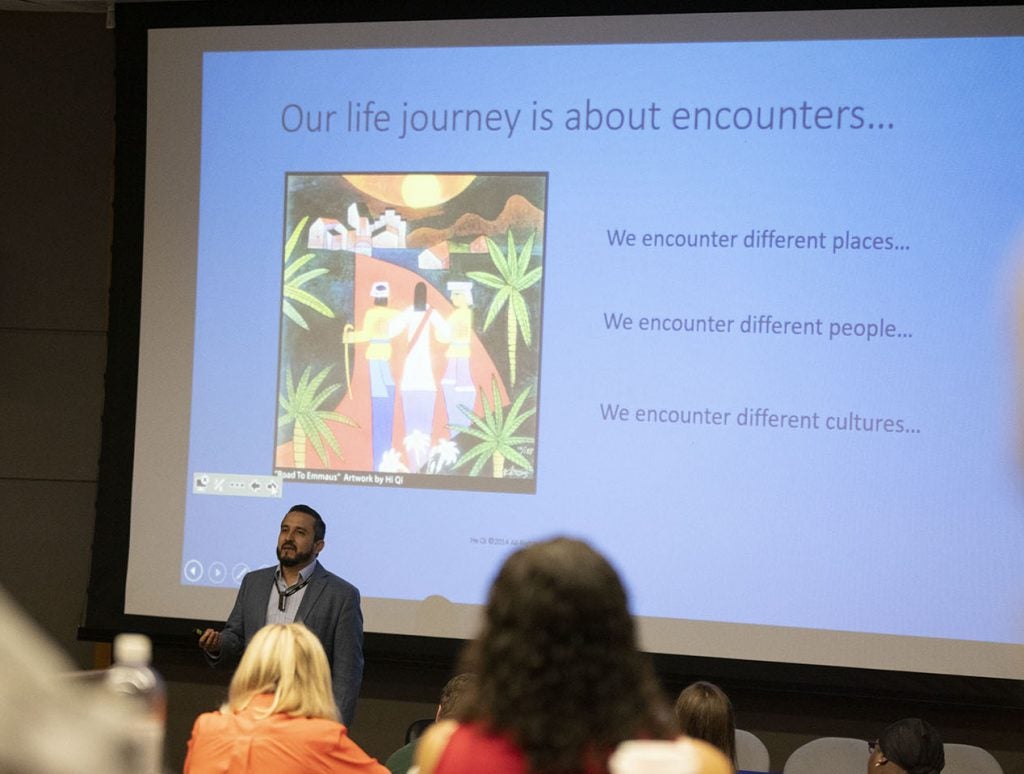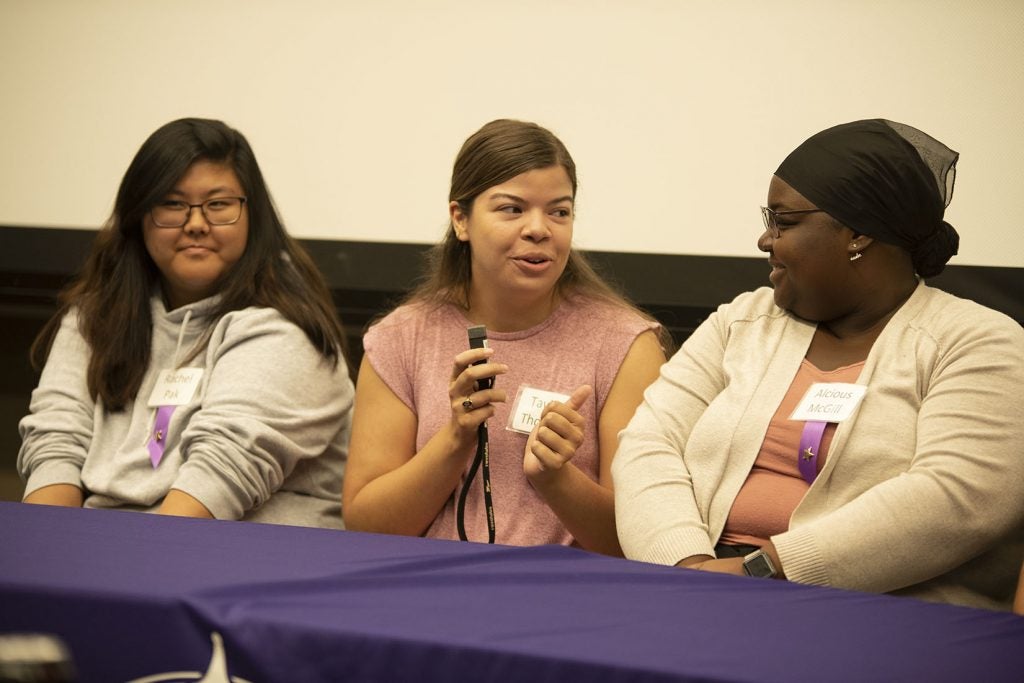College of Nursing annual Diversity Day focuses on cultural humility
The ECU College of Nursing’s annual Diversity Day event, held on Oct. 31, focused on the importance of cultural humility, being conscious of one’s own predispositions and being a lifelong learner of other cultures.
Guest speaker Ismael Ruiz-Millán, director of Hispanic House of Studies, Global Education & Intercultural Formation at Duke Divinity School, discussed how life’s encounters with different people, places and cultures creates preconceptions and biases in everyone.

Ismael Ruiz-Millán, director of Hispanic House of Studies, Global Education & Intercultural Formation at Duke Divinity School, discussed how life’s encounters with different people, places and cultures creates preconceptions and biases in everyone during the Diversity Day event at ECU’s College of Nursing. (Photos by Conley Evans)
Ruiz-Millán explained some of the experiences that influenced his own biases and preconceptions about America as he grew up in Mexico, and how they factored in as he tried to assimilate when he moved to the U.S.
“If I wanted to survive here, I needed to learn about the United States culture. In some cases, I needed to not just learn, but assimilate to the culture of the United States,” he said.
As he continued in his studies, Ruiz-Millán began to feel more confident in his understanding of his new culture. But doing an Intercultural Development Inventory revealed that he had more to learn.
“I realized that I wasn’t as culturally competent as I thought I was,” he said. “It was very humbling. You have to stop and ask, ‘When did I stop learning about others? Especially, when did I stop learning about others who are different than me?’”
Cultural humility, Ruiz-Millán said, relies on a commitment to lifelong learning about others, engaging in critical self-reflection, self-awareness of biases and limitations in understanding and values of humility and compassion.
He reflected on what that means for those preparing to work in health care fields like the students attending the event.
“We need to think about how we can use our power and influence for the common good,” he said. “Some questions to think about are, ‘What are some ways you can learn from your classmates? What are some ways you can learn from our patients? What are some ways you can learn from people different from you?’”

A panel of diverse students discussed misconceptions about their culture and what they wished others understood.
The Diversity Day event also included a panel of students from diverse backgrounds sharing personal experiences about their cultures and the things they wished others understood. A common thread throughout the discussion was the desire for others to ask questions instead of making assumptions based on what they think they know.
Alcious McGill, a student who grew up in Ivory Coast, discussed the comments she often gets from others when she reveals she was born and raised in Africa.
“I had an accent growing up,” McGill said. “But now since I speak the American way, a lot of people are surprised I’m African — ‘Oh, you don’t look African.’ ‘Well, what does an African look like?’ I don’t know.”
When a preceptor asked about her childhood, McGill said the preceptor expressed surprise when she told her that it was a positive experience.
“She was like, ‘Oh wow, I never would have guessed that. That’s the kind of childhood that I had.’ So, would she always assume that everybody that comes from Africa has a traumatic background? I never had a bad experience,” she said.
“All of the things I saw on TV about grass huts, people in grass skirts I saw here when I came to America, and I thought, ‘Oh my God, we have that in Africa?’ A lot of times people are like, ‘Oh were you friends with lions and elephants?’ and I’m like yeah, I swung from trees, too,” McGill said, jokingly. “So, a lot of people assume those things, and I personally think if my preceptor had questions, I would have appreciated her ask rather than coming out and assuming.”
Taylor Thomas, a Native American student who grew up in Fayetteville, explained how her culture’s spirituality and reliance on alternative medicine can sometimes be difficult for others to understand — particularly in a health care setting.
“This particular patient made that apparent that they wanted more spiritual-based care. They were refusing to take medications based off of that belief and the nurse couldn’t understand it,” Thomas said. “The family tried to explain it, and (the health care professionals treating the patient) were taking action to potentially try to force this medicine on this patient. There was an elder from the tribe who came to see the patient and really was able to put it in perspective for the nurse, for the entire staff.”
Thomas said being culturally aware doesn’t necessarily mean that you understand it or that you’re able to put yourself in the shoes of the person and see their perspective.
“I think it’s times like that, and times like these when we’re having an open conversation that we can start to take steps toward cultural humility, being self-reflective and hopefully taking that learning process lifelong to become a little bit more competent and understanding,” she said.
-by Natalie Sayewich, University Communications